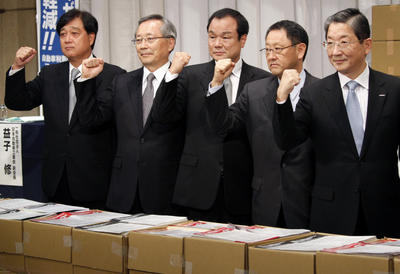Certainly Noda has been the most effective of the three Democratic Party of Japan (DPJ) prime ministers. Unlike predecessors Yukio Hatoyama and Naoto Kan, Noda has remained focused by taking on one policy challenge at a time. He has also skillfully exploited his adversaries’ vulnerabilities in order to drag them into reluctantly supporting his policy program. So it would not be unreasonable to think that Noda may have one or two more policy successes up his sleeve. After all, if Noda and the DPJ are to stand a chance in the next election, they will need more than the single unpopular consumption tax success. And given his earlier interest in the TPP, there are reasons to think that Noda will make a bolder bid for Japan to join TPP negotiations at the September 2012 APEC meeting in Vladivostok.
But there are many more reasons why the TPP will not occupy a prominent place in Noda’s domestic agenda over the next few months. Noda’s increased political vulnerability due to his much reduced lower house majority is a minor factor in this decision, as is Japan’s hesitancy to take on small but powerful political interest groups. This time, the US domestic situation seems to be the biggest barrier to Japan’s entering TPP negotiations.
Earlier this year news emerged that the US would require concessions in six areas related to automobiles before allowing Japan to join TPP negotiations. This included demands for the relaxation of technological, ecological and safety standards, changes to tax treatment for different engine displacements, and concessions on customer service and distribution. Japanese industry reacted to the suggestion that Japan’s automobile market was a closed one by noting that sales of foreign cars in Japan’s domestic market are on the up, and that US automakers are to blame if their vehicles are not selling well. The head of the Japan Automobile Manufacturers Association and president of Toyota, Akio Toyoda, declared that ‘Japan is an open market without any restrictions on imported vehicles and without any tariffs’ on those imports. Toyoda also pointed out that Japanese car manufacturers were having a hard enough time with the extremely strong yen.
The Japanese media has identified such demands and statements as part of a US auto industry strategy to maintain US tariffs at their current levels: 2.5 per cent on imported passenger cars and 25 per cent for trucks. Given that it is unlikely that Japan will accede to the demands, there is suspicion that the real motivation for the allusion to Japan’s ‘closed’ auto market, and demanding pre-negotiation concessions is to either exclude Japan from the TPP or to secure an exemption for the US auto industry.
Japanese officials reacted coolly to the demands. In early June 2012 the Japanese Minister of Economy, Trade and Industry Yukio Edano met with US Trade Representative Ron Kirk on the sidelines of an APEC meeting in Kazan, Russia. Following this meeting, a lower house agriculture committee was informed that there was little hope for Japan being accepted into the TPP until after the US presidential election due to the US automobile industry’s critical influence in swing states. While some in the Japanese media lamented the possibility that Japan would be left behind, the Japanese government started to publicly lower expectations for a rapid Japanese accession.
The Japanese government’s caution was soon vindicated. First, US presidential candidate Mitt Romney, reacting to pressure from the three biggest automakers, stated that he did not support Japanese participation in the TPP ‘at this time’. US Senator Sherrod Brown of Ohio subsequently introduced legislation ‘aimed at preventing a new Pacific trade agreement from harming auto employment’. The TPP returned to the headlines later in June, when 132 House of Representatives’ Democrats sent a letter to Ron Kirk demanding more transparency and better consideration of US stakeholders’ interests during TPP negotiations. This flurry of political activity coincided with US carmakers’ efforts to put pressure on Washington not to let Japan join talks on the TPP.
Japan did not participate in the 13th round of TPP negotiations in San Diego that took place this July, and is unlikely to participate in negotiations in the near future. Those calling for Japan’s immediate accession to the TPP, and for Noda to expend political capital on this goal, need to consider the potentially disastrous effects of pursuing TPP accession under the current conditions and limitations.
Japanese hostility to entering trade agreements with countries with sensitive sectors is no longer the norm. In the last three years Japan has advanced discussions and negotiations to enter economic partnership agreements with a number of nations. It is more a case of a Japanese prime minister who would rather focus on forging trade agreements with nations where the benefits are of tangible value, than with countries that insist on ‘protection’ and special treatment beyond their own national borders.
Corey Wallace is a PhD candidate at the Department of Political Science, the University of Auckland.

